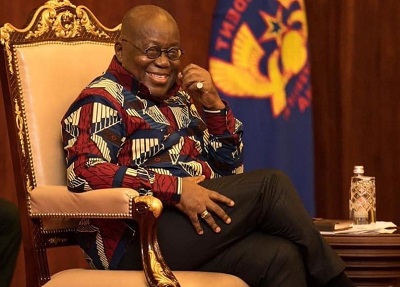Leadership of excellence required in Africa

The National House of Chiefs operating in the kingdom of Ali Baba community was made up of various leaders who did what they could to develop their kingdom. The kingdom was made up of 12 villages, each under a leader or chief who was expected to develop his own village with the support of his own people.
They came together in form of a group to form a National House of Chiefs like what we have in Ghana today. Some of the chiefs were very progressive but others were not because they could not influence their subjects to move along with them for the betterment of society. Many others were also discouraged from pursuing vigorous agenda geared towards the ultimate goal of progressive development.
HANDFUL OF LEADERS
There were a handful of leaders within that National House of Chiefs who worked so hard that their communities were soon to be seen as exemplary when compared with other communities in that kingdom. It may sound strange to speak of a kingdom with several chiefs spearheading their affairs of each community and thereby bringing them together in form of a National House of Chiefs.
That was their own choice and if they were satisfied with that arrangement, no one from another area could begrudge them. In other words, if they found the arrangement suitable to their own interests and development, they were not prepared to accept any criticism from any quarters. Africa constitutes one large kingdom in a sense but there are many countries that form part of this continent.
CONTINENTAL DREAM
This explains why the early leaders of the continent under Kwame Nkrumah, Julius Nyerere, Jomo Kenyatta and many others found it necessary to dream of one continent in form of a United States of Africa. This could not go beyond the envisaged dream as a result of which the continent is still fragmented into different countries even though many Africans believe that one large “Kingdom” or continent could have been to the benefit of all Africans.
WHY WAS THIS NOT MADE POSSIBLE?
The colonial interests manipulated many of the African leaders at the time even though some of them were genuinely committed to the idea of one continental “Kingdom”. Again, some of the leaders at the time were more influenced by their parochial passion of not letting go the small area over which they were ruling as leaders.
Perhaps, they preferred to be called presidents of smaller areas instead of falling into the larger vision of one kingdom, after giving out parts of their own countries, for the common good in line with the entire continental interest of the African “Kingdom”.
Today, each of the states in Africa has realised the need to fight for this “Kingdom”, thereby influencing one another to trade among themselves in form of African Continental Free Trade Area (AfCFTA). The AfCFTA, as is well known, forms the largest trading bloc in the whole world. It is meant to accelerate intra-African trade and boosting Africa’s trading position in the global market by strengthening Africa’s common voice and policy space in global trade negotiations.
NUMEROUS CONTINENTAL CHALLENGES
In view of the numerous challenges the African continent faces today, there is no doubt that the leadership style in Africa is required to be propelled to higher levels where excellence would become the hallmark of performance to bring in the desired good governance, progress and economic development.
This is due to the availability and also abundance of natural resources on the continent. To be able to achieve smooth continental economic recovery and growth, a set of certain fundamentals will have to be put in place by each African country. One of them is getting sound programmes in place for rapid economic growth.
NEED FOR GOOD GOVERNANCE
Good governance is what we need as a solution to the problems in Africa. Peace and security challenges are largely the manifestation of governance challenges such as how we manage our elections. When it comes to issues relating to terrorism, diversity management, socio-economic development and other related matters, they are all about governance.
In Ghana, President Nana Akufo-Addo has been able to put in place projects like One-Village, One-Dam; One-District, One-Factory and others like Planting/Rearing for Food and Jobs. All these will take some time – not too long though – before results can be seen and/or experienced. What is important now is that Ghana is on the right path of economic recovery.
ECONOMICALLY UNPALATABLE SITUATION
President Nana Akufo-Addo came into office when things were economically unpalatable, or that the country was in a situation that was, and still is, very difficult so we cannot overcome every problem immediately.
The free SHS, for example, has helped enrollment at the second cycle level to increase from 52 per cent to 85 per cent. This is quite remarkable and will have a positive impact on the socio-economic development of the country soon.
Again, the increase in the supply of maize and other foodstuffs as a result of the planting for food and job programme, among others, are meant to put the economy in shape and lessen the burden of Ghanaians soon. What we need to do now is to be patient and positively participate in the national development programme to bring about the expected result in line with our national development agenda.
ECONOMIC RECOVERY
The path to national economic recovery is not an easy one so we expect every person to support the government to ensure that at the end of the day all of us become beneficiaries of all the programmes that have been put in place for our common good. Standing aloof and unreasonably criticising every good thing planned for the country will not help us in any way.
It is in the light of all this that not long ago Ghana’s President was named as Africa’s best President by virtue of a poll conducted by a Canadian-based research organisation known as “Leaders of Tomorrow”. Additionally, Forbes Africa magazine, only a week ago, named President Akufo-Addo as its African of the Year. In view of the positive leadership style and progress being made in Ghana, some citizens on the continent have openly expressed the wish that their preference would have been to have Nana Akufo-Addo as President of their country.
POSITIVE POLICIES
It is the belief of the Canadian research team that since President Akufo-Addo won the 2016 election in Ghana, he has been the man of the people with high approval rating for his positive policies such as the Free Senior High School Education, Planting for Food & Jobs, One-District-One-Dam, National Builders Corps (NABCO) and other initiatives to generate employment, among others.
It has also been pointed out by the research team that the Ghanaian President is highly committed to the development of the country, stands strongly against corruption and has great respect for good governance and the rule of law. This, they say, has placed President Akufo-Addo first on the list in Africa and third in the world of the best presidents with vision.
Forbes, in a statement, said “Ghana’s President has repositioned the country in the global marketplace as one reliant on its own resources and strengths.” Extolling the virtues of President Akufo-Addo, which led to Forbes awarding him the prestigious African of the Year crown, South African President Cyril Ramaphosa, said: “We are proud of this recognition, Your Excellency, because it speaks of your commitment, it speaks of your creativity, your innovation, and your clear strategic vision of what should happen in your own country, as well as on our beloved African continent.”
Ghanaians in particular and Africans in general ought to be proud of this great achievement because it goes to show that after all, with the needed commitment, zealousness and/alacrity, the African is capable of managing his or her own affairs as it was pointed out by Ghana’s first President, Dr. Kwame Nkrumah.
Africa must progress to a higher level, but can the continent ever make it to the top? Yes, it can. And this is where good governance must become a priority. The rest of the continent must emulate Ghana to overcome seeming economic challenges.
Consistently promoting good governance in Africa – rule of law, transparency, responsiveness, consensus oriented, equity and inclusiveness, effectiveness and efficiency, accountability, participation – is what the continent needs now to get there!
Contact email/whatsApp of author:
pradmat2013@gmail.com (0553318911)
BY DR. KOFI AMPONSAH-BEDIAKO













